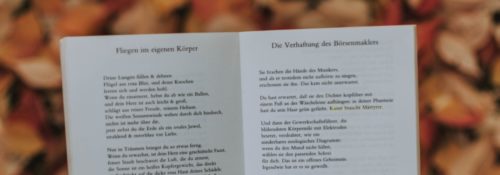
The Art of Words: Visiting Poet Forester McClatchey, ’16
Written by Lauren Smith
Forester McClatchey, ’16, recently visited campus to read his poetry in Plaster Auditorium. One of my favorite poems that he read, one that was also a finalist for Plough Quarterly’s annual poetry prize, centered on a cozy theme: watching his wife make a Christmas wreath. McClatchey’s artistic touch transformed this story, simple though it was, into an extraordinary scene I could easily picture. Intrigued, I sat down with McClatchey after the reading to ask him for tips on how aspiring student poets—or anyone who wants to infuse their writing with color and description—can follow in his footsteps.
His first piece of advice was to take advantage of Hillsdale’s curriculum and read as much as possible. “Hillsdale students are lucky in the sense that they are forced to read more canonical literature than most college students,” he told me, adding: “That’s a huge advantage when you’re a writer.” He also recalled a quote from one of his professors at the University of Florida, who told his students to “read what no one else is reading,” by which he meant read the classics, read older authors, read authors whose works have almost been forgotten.
McClatchey also recommends taking breaks from the computer to write on paper instead. “When you’re forming each letter by hand, it takes more effort than tapping a key … so you’ll think about your word choice.” Special caution is required when dealing with adjectives and adverbs. McClatchey warned that “if you find yourself using a lot of adjectives and adverbs, that’s a good sign you don’t have anything more to say.” To catch dicey word choices, McClatchey encourages reading aloud, either to yourself or, better still, to a friend.
When faced with writers’ block—a problem everyone from accomplished poets writing their thousandth poem to college students struggling over a term paper must overcome— McClatchey provides a simple solution: Don’t write. In his own words, “I think when you’re writing something worthwhile, you’re not fully in control. Something is trying to be born through you. Having the humility to wait for that and help it along instead of trying to control it is one of the most difficult parts about being a writer.”
Now, let’s say you’ve followed McClatchey’s advice so far, and you’ve finished your first poem. What now? What do you do with what you’ve created? McClatchey advises writers not to rush to get their work published. Above all, he cautions, don’t self-publish unless you’re willing to accept the risk of your work not being taken seriously. “Getting obsessed with being published has ruined so many writers I know. Learning the mechanics takes time, so I wouldn’t worry about it.” It’s okay, he adds, to feel a little lost. There are plenty of opportunities for writers. He suggests looking for literary journals and submitting to 5-10 of your favorites. “It’s all about persistence, and you will get rejected a lot no matter how good your work is … I would encourage people to try to get published if they want to, but not to invest too much soul and energy into it. Reserve that for your writing.”
As we wrapped up the interview, McClatchey added a final word of caution: Don’t forget to assess how your poetry affects the audience. At a university poetry reading he’d attended, one of the poems was so long, so tedious, and so difficult to follow that one of the audience members, bored nearly to death, fainted in the middle of the reading. “It was kind of poetic that someone just collapsed,” he said thoughtfully, then chuckled. “That was quite an experience,” but probably not the one most authors want to give their listeners!
Though McClatchey’s writing advice was intended specifically for poets, Hillsdale students can apply it more broadly. Whether it’s an essay, an article for the Collegian, or a free-time project, each writing assignment deserves the same care and attention McClatchey gives his poetry. As he finished reading his poem about the Christmas wreaths, I found myself wanting to experience the scene he described, to hear more about the wintry setting, to make my own “completed circle, made of endings.” Reading beautiful writing, as McClatchey said, gives you a “different flavor and different words of wisdom that you can carry into your own work” and deepens interest in the subject—an experience every Hillsdale student should strive to give their readers.
 Lauren Smith, ’25, is a prospective political economy major and French minor. Outside of starting arguments in philosophy class, she enjoys curling up on a bench outdoors (sun, rain, or snow) to write novels or articles for her blog, www.laurensmythbooks.com.
Lauren Smith, ’25, is a prospective political economy major and French minor. Outside of starting arguments in philosophy class, she enjoys curling up on a bench outdoors (sun, rain, or snow) to write novels or articles for her blog, www.laurensmythbooks.com.
Published in November 2021